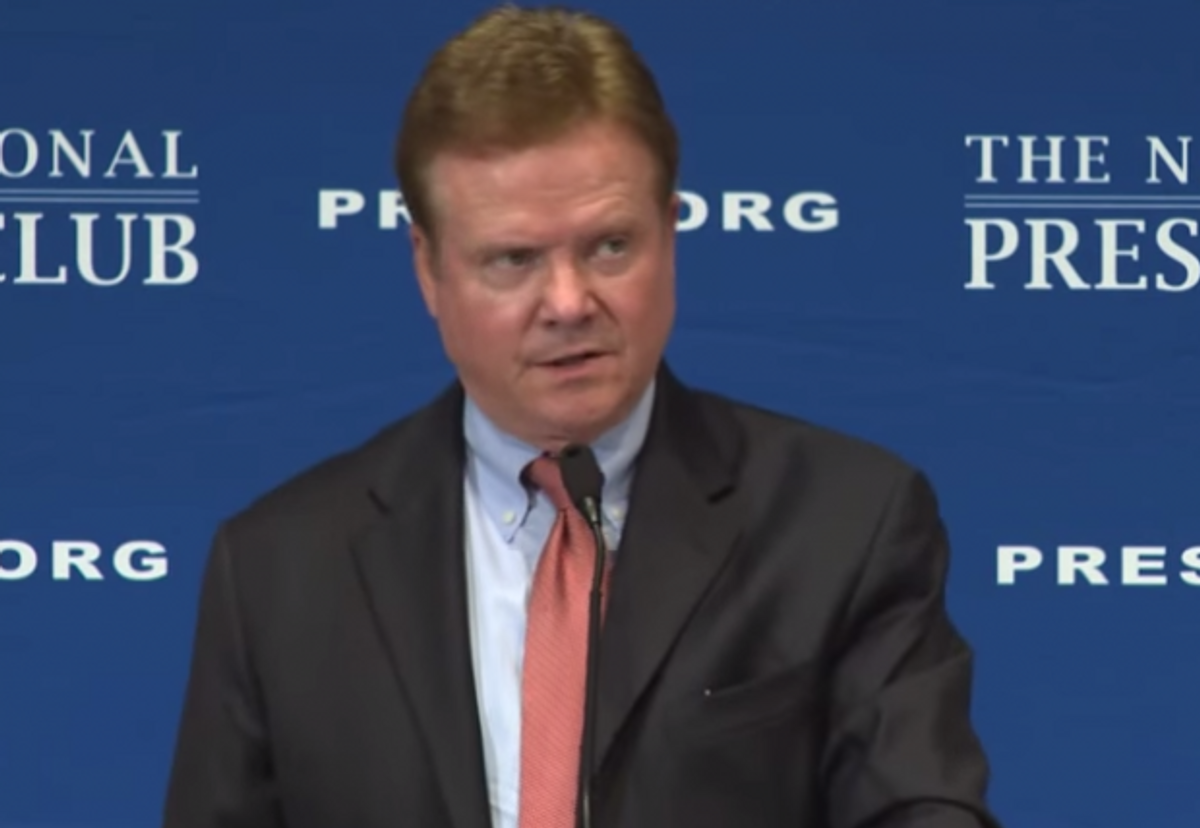Former Sen. Jim Webb of Virginia on Thursday announced that he's forming a presidential exploratory committee, becoming the first prominent Democrat to make a formal foray into the 2016 contest.
Webb, a Marine combat veteran who served as President Ronald Reagan's Navy secretary, left the Republican Party in disgust over the Iraq War. Narrowly defeating GOP Sen. George Allen in 2006, Webb arrived in the Senate as a leading Democratic voice on foreign policy and national security issues. But frustrated with the slow pace of Senate life, Webb left the chamber after just a single term, although he vowed to remain involved in the national debate.
At the time, few expected that a Webb presidential bid lay in store, but the former senator believes that his appeal to white, working class voters and his foreign policy expertise offer him unique advantages in a field likely to include former Secretary of State Hillary Rodham Clinton, who's seen as the prohibitive Democratic frontrunner. Tapping into progressive angst that Clinton opts for cautious centrism over bold leadership, Webb has indicated that he'll pitch himself as a leader who rejects small-bore politics.
“There is a big tendency among a lot of Democratic leaders to feed some raw meat to the public on smaller issues that excite them, like the minimum wage, but don’t really address the larger problem,” Webb recently told The New Yorker's Ryan Lizza. “A lot of the Democratic leaders who don’t want to scare away their financial supporters will say we’re going to raise the minimum wage, we’re going do these little things, when in reality we need to say we’re going to fundamentally change the tax code so that you will believe our system is fair.”
Similarly, in his exploratory committee announcement, Webb said, "A strong majority of Americans agree that we are at a serious crossroads. In my view the solutions are not simply political, but those of leadership. I learned long ago on the battlefields of Vietnam that in a crisis, there is no substitute for clear-eyed leadership."
"We need bold leadership that can tap into this talent, for the good of the country. We need people who will put the well-being of all of our citizens ahead of any special interest group, and who understand how to manage our complex federal system of government," he added.
In accordance with his effort to portray himself as a bold leader and policy innovator, Webb said that he was ahead of the curve on income inequality, an issue that has galvanized the progressive base of the Democratic Party; foreign policy; and criminal justice reform.
"In 2007, I gave the response to President Bush’s State of the Union address. I put economic fairness for our working people and small business owners at the front of my response, noting the immense and ever-growing disparities in income between corporate executives and those who do the hard work. When I graduated from college the average corporate CEO made twenty times what his workers made," Webb said. "Today that number is greater than 300 times. The inequalities between top and bottom in our country are greater than at any time in the last hundred years. And the disparities between those at the very top and the rest of our society have only grown larger since the economic crash of late 2008 and early 2009."
In addition, Webb noted that he advocated a greater role for Asia in U.S. foreign policy well before the Obama administration, with Clinton as secretary of state, announced its much-ballyhooed "pivot to Asia."
Notably, Webb offered a not-so-thinly-veiled jib at Clinton, whose election many fear would entrench dynastic politics in the U.S.
"Our Constitution established a government not to protect the dominance of an aristocratic elite, but under the principle that there should be no permanent aristocracy, that every single American should have equal protection under the law, and a fair opportunity to achieve at the very highest levels while at the same time reducing ill-considered foreign ventures that have drained trillions from our economy and in some cases brought instability instead of deterrence," Webb said.
Among those "ill-considered foreign ventures" Webb opposes is the U.S. intervention in Libya, which Clinton enthusiastically backed during her State Department tenure. Speaking of Syria and Libya with Lizza, Webb said, “I was saying in hearings at the time, What is going to replace it? What is going to replace the Assad regime? These are tribal countries. Where are all these weapons systems that Qaddafi had? Probably in Syria. Can you get to the airport at Tripoli today? Probably not. It was an enormous destabilizing impact with the Arab Spring.”
While Webb will position himself to Clinton's left, he has engendered suspicion among many liberals throughout his career. In 2008, when Webb was reportedly under consideration to serve as then-Sen. Barack Obama's running mate, The New Republic's Richard Just assailed Webb's worldview as "fundamentally illiberal" and "downright creepy," citing Webb's chest-thumping Scots-Irish nationalism, past opposition to women serving in combat (expressed in an article titled "Women Can't Fight"), and his apologism for the Confederacy.
Elizabeth Warren he is not.



Shares